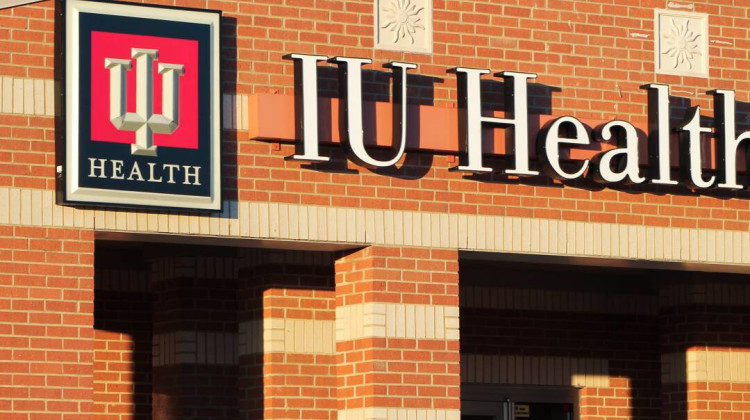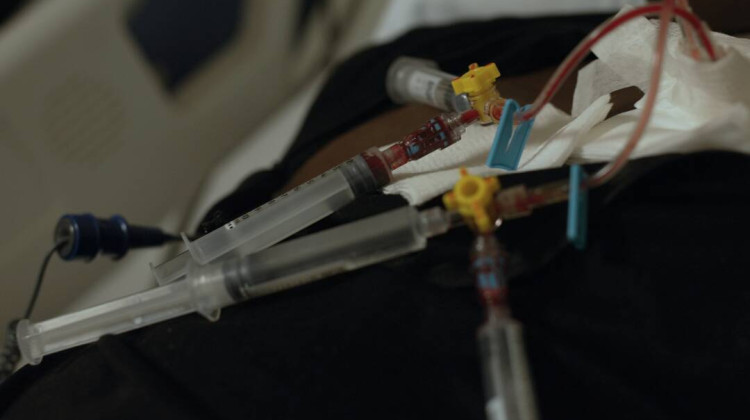
Lawmakers said the policy is targeted at the "big five" systems in Indiana — Indiana University Health, Parkview Health, Franciscan Health, Community Health Network and Ascension Health. The large nonprofit hospital systems would have to cap their prices starting in July and not exceed that cap through June 2027.
Abigail Ruhman / IPB NewsLarge nonprofit hospital systems would be prohibited from raising prices for two years under an amendment approved by a Senate committee. The bill is meant to address health care costs in Indiana — but has faced harsh criticism from some lawmakers.
Under the Senate Appropriations amendment to House Bill 1004, Indiana's largest nonprofit hospital systems would not be allowed to exceed the prices set before January 1, 2025.
Sen. Chris Garten (R-Charlestown) said the price freeze is just one step of the process laid out in the bill.
"We're just asking hospitals, 'Look, we're not doing anything to you for two years. Just stabilize the market and stop raising health care prices on Hoosiers for two years,'" Garten said.
Garten said the policy is targeted at the "big five" systems in Indiana — Indiana University Health, Parkview Health, Franciscan Health, Community Health Network and Ascension Health. The large nonprofit hospital systems would have to cap their prices starting in July and not go above that price through June 2027.
While the price freeze is in effect, Garten said the Office of Management and Budget will conduct a hospital pricing study.
"There's a lot of distrust around every study out there," Garten said. "A lot of studies are funded by hospitals. A lot of studies are funded by employer groups. When one's funded by one, the other group doesn't trust it."
Garten said lawmakers believe OMB is the best place for that study because it already has the staff with the fiscal expertise to conduct the study.
Following the price freeze, Garten said hospitals would have to lower prices by a certain percentage each year until they reach the goal set by the outcome of the OMB study. HB 1004 does have numbers currently set in place that Garten refers to as "placeholders" until lawmakers and other stakeholders can look at the data coming out of the study.
Sen. Liz Brown (R-Fort Wayne) said the bill takes away the ability for hospitals to react to outside factors that can influence prices.
"Doesn't matter if we have another pandemic," Brown said. "Doesn't matter if the tariffs increase. All the costs of services and goods that come into your hospital system — you can't raise your prices for the next two years, period."
Brown said a majority of the Senate health committee didn't support the previous language meant to address high prices in nonprofit hospitals.
The previous version of the bill outlined that nonprofit hospitals that charge more than 300 percent of their modified Medicare reimbursement rate would lose nonprofit status.
Most lawmakers in the Senate health committee moved the bill forward citing the Hospital Assessment Fee provision also included in the bill. The language was originally in House Bill 1586 and redesigns how the Medicaid expansion program in Indiana is funded and how hospitals are reimbursed.
Join the conversation and sign up for our weekly text group: the Indiana Two-Way. Your comments and questions help us find the answers you need on statewide issues, including our project Civically, Indiana and our 2025 bill tracker.
Brown said the price freeze language would mean nonprofit hospitals are the only industry in Indiana with a "price cap" in place.
Garten said the legislation did not put a cap on prices, despite the amendment summary referring to the price freeze as a "cap" on prices.
At this point in the process, Brown said lawmakers only have second reading and the potential for a conference committee to work out the issues and concerns with the bill.
"This barely went through health — nobody liked the bill," Brown said. "It just got a lot worse, but we're still not done."
She said there's less than two weeks left of the legislative session and lawmakers are running out of time.
Other lawmakers on the Senate appropriations committee raised concerns about how HB 1004 could impact contracts the hospital systems already have in place and the impact this could still have on rural communities.
The bill now heads to the full Senate.
Abigail is our health reporter. Contact them at aruhman@wboi.org.
 DONATE
DONATE






 Support WFYI. We can't do it without you.
Support WFYI. We can't do it without you.